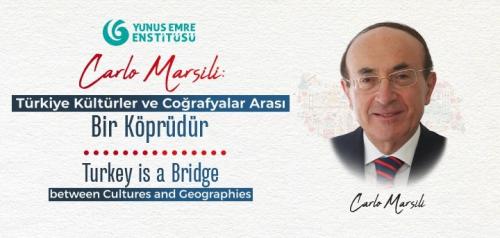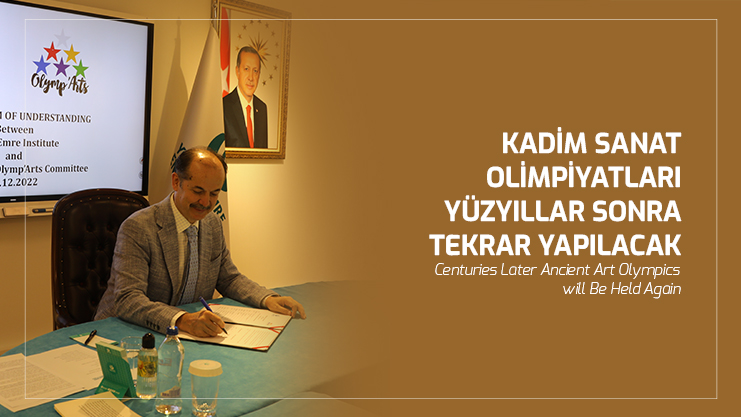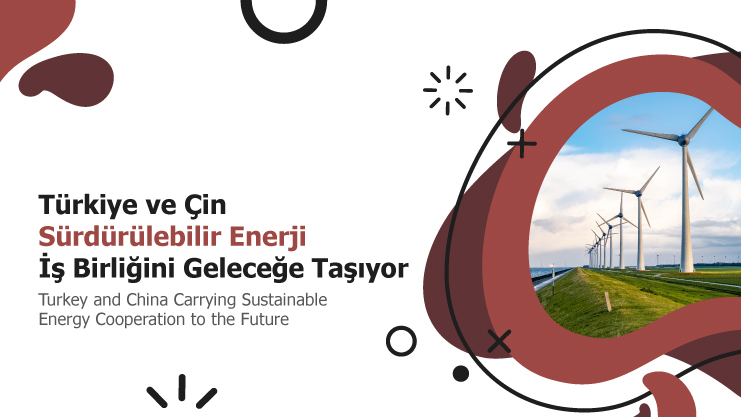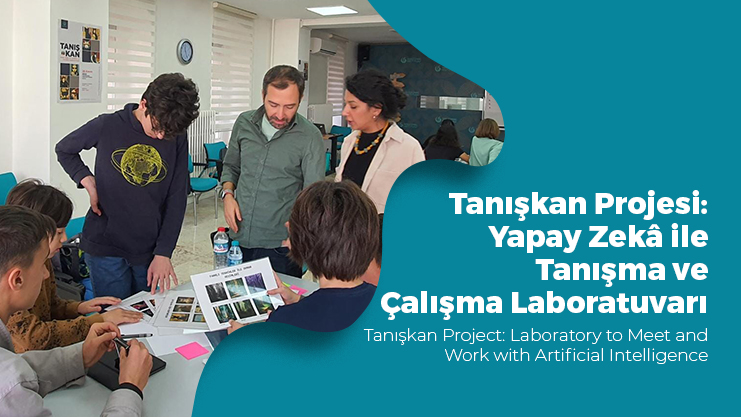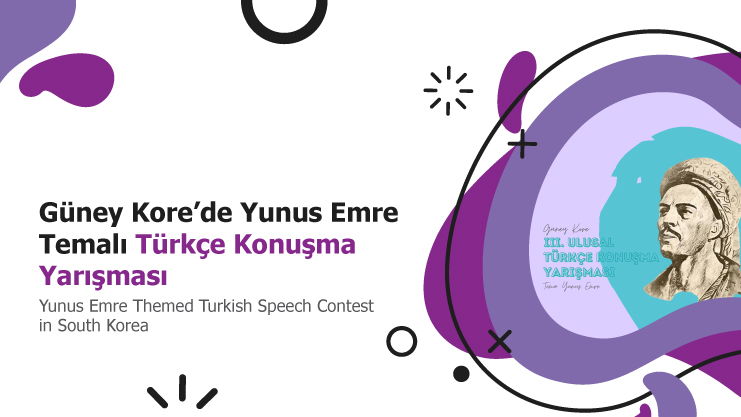Carlo Marsili: Turkey is A Bridge Between Cultures and Geographies
Yunus Emre Institute hosted Italy's former Ambassador to Ankara Carlo Marsili under its program series "On Turkey". President of Yunus Emre Institute Prof. Şeref Ateş and the Director of Rome Yunus Emre Institute Sevim Aktaş attended the program where Marsili said "I am very glad to represent Turkey and convey the beauties of Turkey" by indicating that Turkey acted as a cultural and geographical bridge.
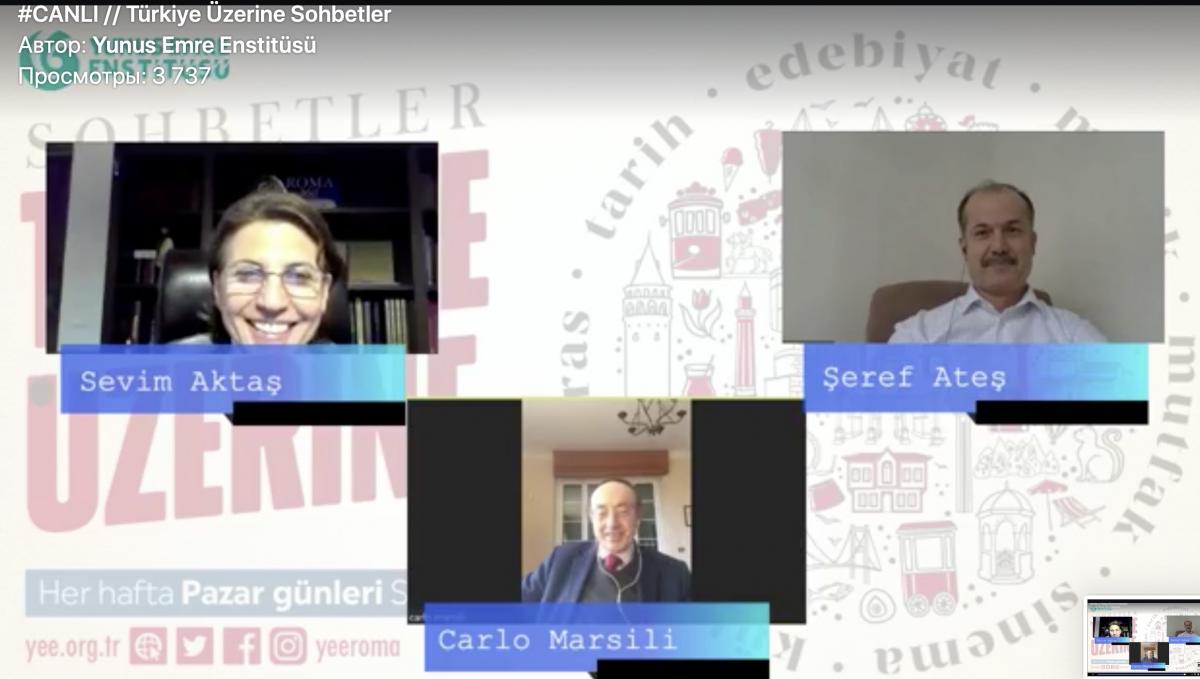
On December 6, 2020, Yunus Emre Institute hosted Italy's former Ambassador to Ankara Carlo Marsili under its program series "On Turkey". Hosted by the President of Yunus Emre Institute Prof. Şeref Ateş and the Director of Rome Yunus Emre Institute Sevim Aktaş, Carlo Marsili talked about his impressions on Turkey.
At the beginning of the program, Sevim Aktaş gave information about Ambassador Carlo Marsili's diplomatic career. Aktaş laid emphasis on the book "Turkey is Knocking on Our Door" by Marsili putting a great effort to develop the relations between Turkey and Italy. Aktaş stated that he covered many elements of Turkey such as its social characteristics and foreign policy within his book.
Prof. Şeref Ateş, President of Yunus Emre Institute, made the following remarks:
“The particular aim of establishing Yunus Emre Institute is to build a bridge between people from around the world and the Turkish people. While building this bridge, our basic philosophy and thought is to relive the already existing life bond between people. In this respect, Yunus Emre is similar to the Italian philosopher Giordano Bruno. He lived long after Yunus and advocated the eternity of the Universe and the unity between souls. Unfortunately, he was brutally murdered, punished and killed under the conditions of his time. Now, humanity understands his value. Similarly, the value of Yunus is understood again. In 2021, the 700th anniversary of Yunus Emre's demise was also recognized by UNESCO. Therefore, from this perspective, your personality shows that these two important nations have lots of things to learn from each other in terms of both the culture and mentality."
Ambassador Marsili gave the following answer to Sevim Aktaş's question "How would you describe Turkey and what comes to your mind first when you think of Turkey?".
“First of all, I would like to thank the Director of Rome Yunus Emre Institute Sevim Aktaş. I follow all activities of Rome Yunus Emre Institute with great interest. As a matter of fact, it shows that similarities are very interesting and rich between the two countries and, beyond that, it fulfills a very important duty for the ties between them and performs activities in this vein. With your permission, I would also like to thank the president of your institute Prof. Şeref Ateş. I would like to extend my deepest regards to him for his kind greeting message. I appreciate him a lot. You mentioned about Giordano Bruno during your speech. I am really pleased that you have referred to him because Giordano Bruno is a really important figure for us. He is very important not only for us, but also for human history, universal history. It is very appropriate that you have established a connection between him and Yunus Emre. I think these two thinkers are definitely a very important reference for human history and for us.
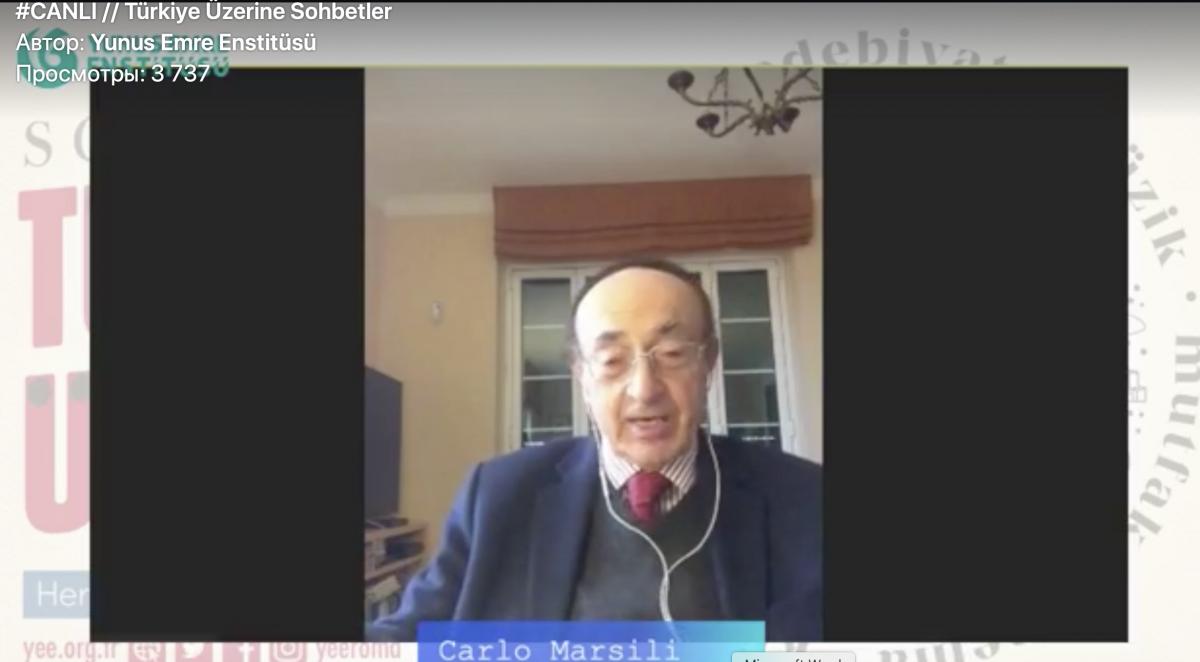
Stressing that it is very important to describe Turkey in an accurate way, Marsili went on to say: Turkey is not a well-known country and it is not known very much. I did not only stay around Italy and I wandered around many countries of the world. However, Turkey is not known by many and is considered as a far-away country. This was my impression. But Turkey is a great and well-established country for Italy. I would like to express this especially by underlining it. When we consider its position in terms of geography and strategy, it is located at a very important connection point between Europe and Asia, between the East and the West, establishing significant connections with Eastern Balkans and the Middle East. Of course, it is located in a very important position. This is not only limited to its geographical location. Of course, we need to emphasize its geographical location because its geographical position ensures that Turkey has an important place within the political map of Europe."
"Just as we know very well from Istanbul, Turkey is divided into two sides: Europe and Asia. This allows Turkey to perform great activities. Sometimes, this brings about the following misunderstanding in geographical terms: It may be misunderstood that Turkey is divided into two in cultural terms and two different cultures are experienced. It seems as if two different opinions are present regarding Turkey's accession to the EU. However, Turkey is a country totally integrated to Europe in general terms because Turkey and a part of Russia are an inseparable part of the European continent. I also worked on a doctoral dissertation. And within the scope of this thesis, we discussed that we needed to think of Europe from the Atlantic to the Ural Mountains in geographical terms. For example, Cyprus is located in the easternmost part of the western border of Turkey, but we know that it is located in Europe in all aspects."
MARSILI: YUNUS EMRE LIVING IN ANATOLIA IS A VALUE FOR THE ENTIRE HUMANITY
Marsili gave the following answer to the question of Sevim Aktaş "You have said that Turkey acts as a geographical bridge between the two countries. Do you also think that Turkey is a cultural bridge between these two cultures?":
“Yes, we need to make a clearer emphasis on the culture when compared to geographical aspects. I would like to say that it functions as a cultural bridge. For instance, I would like to remind you that Sufism was born in Anatolia. Yunus is our widely-esteemed Sufi poet and mystic for Anatolia and the entire humanity and we will commemorate the 700th anniversary of his demise as reminded by our Distinguished President. He grew up in the Anatolian land."
Indicating that the Ottoman Empire and the establishment of the Republic of Turkey were also very important for Turkey to build an intercultural bridge, Ambassador Marsili went on to say:
“The Ottoman Empire did not dominate over two continents, but actually three continents. There was also a bridge function in this sense. Then, we see the Republic of Turkey founded by Atatürk. With the establishment of the republic, the country made a very important transition by adapting the laws of Europe to its own system, adapting its culture codes into its own system, secularizing the state and adapting the system into its own needs. In this respect, it has combined the two countries and the two continents in all aspects. We can give many other examples. Many Turkish universities including Ankara have Italian language and linguistics departments. Likewise, Turkish language and literature are studied in many Italian universities. We can say that cultural exchange is very considerable especially on the part of the students. But one can say that this cultural exchange started in 800s. If you remember, there was a significant movement of orientalism back in 800s. Therefore, the west had lots of knowledge on this subject. We can also stress on the history in this sense. We can see that Turkey has been an inseparable part of Europe not only during recent period, but also for various centuries because the Ottoman Empire was one of primary guiding forces and leading actors in our continent. Nevertheless, the modern Turkey is always a part of international organizations within Europe. Being one of the founding members of the Council, Turkey has a direct membership application to the EU. Turkey is already a member of the NATO. Therefore, Turkey is one of the indispensable and strategic partners of international organizations. Turkey has become quit connected to the Middle East especially due to the recent conflicts in Syria, the resulting migration waves as well as the disputes experienced with regard to these issues. It has a very strong presence in the Eastern Mediterranean. Turkey is one of the strong partners that are prominent over the East Mediterranean."
"TURKISH SOCIETY IS EXTREMELY CIVILIZED, GENTLE AND ELEGANT"
Sevim Aktaş asked the following question: "You had the opportunity of getting to know the Turkish society closely as you lived in Turkey for a very long time. What are the most distinctive characteristics of the Turkish society and what makes Turkey different from its bordering countries?". Carlo Marsili responded as follows:
Carlo Marsili: Talking about to what extent I know Turkey, I attended many wedding, circumcision and funeral ceremonies. I saw closely how the Turkish society behaved during such different life stages and my impression of them was always very positive. |
I lived in Ankara, Turkey for a total of 9 years. I spent 7 years as an ambassador and 2 years as a young diplomat between 1971 and 1984. I have many Turkish friends in Turkey. As you know, my wife is also a Turk. My relations with the country are still going on. I have very important connections with researchers and the academic world. I also authored a book. What impresses me most about Turkey is that it has an extremely-civilized, gentle and elegant society. At the same time, there is a very strong hospitality culture. Of course, a society that loves its homeland with very strong feelings. This is a very important characteristics for describing the Turkish society. Currently, we see some conflicts through some discourses such as "A Turk's only friend is another Turk." but I personally consider Turkey as an absolute friend. My own experience shows that when you make friends with a Turk, this friendship lasts forever. Likewise, the characteristics making Turkey different from its bordering countries are its moderate Islam approach and the experience of Islam culture in a very tolerant nature. A very high level of tolerance is present in Turkey owing to the secularist reform introduced by Atatürk and the integration thereof into the society through a republican constitution.
RECOGNITION OF TURKISH WOMEN'S RIGHT TO VOTE AND STAND FOR ELECTION IS AN INDICATOR OF CIVILIZATION
It cannot be expected that such a large country is completely homogeneous. There are people living by coasts and those living in Anatolia within Turkey. Maybe, we can say that the people in Anatolia are a bit more traditional and conservative. I have been to Antalya, Kayseri and Diyarbakır. Frankly, I have seen that people see Italy with incredible sympathy. Throughout my assignment, I saw great interest in cultural events and I received great attention and affection as someone representing Italy. We organized an Italian opera in Diyarbakır castle. It was a very important event with the participation of the mayor and people of Diyarbakır. Talking about to what extent I know Turkey, I attended many wedding, circumcision and funeral ceremonies. I saw closely how the Turkish society behaved during such different life stages and my impression of them was always very positive. At the same time, there were Turkish women, whom I admired greatly. I admire all Turkish women. Turkish women have made a considerable contribution to the development of the Turkish society. Of course, very tremendous efforts were made to liberate women. Women in Turkey also showed support for these efforts. Women gained the right to vote in Turkey 12 years before those in Italy. This shows how civilized and developed Turkey is as a country.
"WITH THE TOLERANCE OF ISLAM, I HAVE NOT EXPERIENCED THE SLIGHTEST PROBLEM"
Carlo Marsili gave the following answer to Sevim Aktaş's question "What do you think about Turkish diplomacy?":
"I have met many Turkish diplomats throughout long years. For this reason, my views on Turkish diplomacy are extremely positive. Sometimes, certain prejudice is possible with regard to its image. This is a situation that makes me sad. Because I tell such people that they will experience a very different society if they stay in Turkey for 24 hours. Because misperceptions may emerge regarding Turkey. I have not had any difficulty concerning Islam and I have not had the slightest problem owing to the tolerance brought about by Islam, either. |
I have met many Turkish diplomats throughout long years. For this reason, my views on Turkish diplomacy are extremely positive. I shared this thought with all my colleagues. I believe that Turkish diplomats represent the most positive aspects of the country. This is not easy at all. Sometimes, certain prejudice is possible with regard to its image. This is a situation that makes me sad. Because I tell such people that they will experience a very different society if they stay in Turkey for 24 hours. I strongly believe that this is possible in 24 hours. Because misperceptions may emerge regarding Turkey. I have not had any difficulty concerning Islam and I have not had the slightest problem owing to the tolerance brought about by Islam, either. I have been in Turkey for long years. If you remember, I have mentioned that I stayed in Turkey between 1979 and 1981. Even then, I did not face any difficulty as a foreign diplomat. I still maintain friendships I have established over years. I did not have any difficulty, either religiously or diplomatically. There is a significant marble monument at the entrance of the Ministry of Foreign Affairs in Ankara. It is a monument dedicated to the diplomats killed by Armenian terrorists. So, I believe diplomacy is really an important way to solve many problems. Of course, Turkish diplomacy is very compact and very intense and a diplomacy with considerable national unity in itself. Various meetings are held in Turkey for diplomats and ambassadors. I consider this initiative really useful. As a diplomat, I came together with my colleagues under the Ministry of Foreign Affairs. I meet all other colleagues through these meetings. I meet them again. Me and my wife try to meet them when we have the opportunity of traveling. I am trying to follow developments and relations with Turkey by drinking coffee with them.
As you know, the treacherous coup attempt in 2016 was also one of the challenging points for Turkish diplomacy. We saw how this incident was resonated in different ways from Turkey and the world. Many different developments occurred in Turkey. Turkey is currently a republic governed by a presidential system. Of course, it is quite normal that cultural ambassadors are appointed by presidents when there is a shift to a presidential system. As a diplomat, I am very pleased to represent Turkey and conveying the beauties of Turkey. I know the President of the United Nations General Assembly Volkan Bozkır and he is my friend. I met many diplomats voting for different parties and I want to emphasize that I did not experience any problem. Likewise, I also meet Mr. Murat Salim Esenli, Turkey's Ambassador to Rome. Overall, I consider Turkish diplomacy very efficient."
"I CONTINUE TO OFFER SUPPORT TO TURKEY'S EU MEMBERSHIP"
Sevim Aktaş directed the following question to Marsili: "You are one of the persons giving utmost support to Turkey's EU membership with many Italian authorities. Why is Turkey's EU membership necessary? What are common denominators for Turkey and Europe?"
Carlo Marsili made the following comments on his support for Turkey's EU membership:
"I gave utmost support to Turkey's EU membership throughout my entire career and I continue to do so. I have expressed these views before both the Italian government and other European countries. I would like to state that there are nearly-perfect relations between Italy and Turkey in this sense. Former Italian Prime Minister Carlo Azeglio Campi paid a visit to Turkey in 2005 and former President Giorgio Napolitano paid 2 visits in 4 years. Similarly, Romano Prodi, a very important Italian prime minister, paid very important visits to Turkey. Our relationships are almost perfect. We have good contacts at the level of state heads. I believe that the EU will make good headway by developing joint relations with Turkey. Some slowdown is apparent in the accession negotiations of Turkey and the EU. Some countries backtracked. They especially acted for raising difficulties regarding the process. In 2005, all governments within the EU agreed on the initiation of accession negotiations for Turkey. And the beginning of these negotiations covered a new understanding that Turkey's EU membership would be official in a short period of time. During these years, a very significant reform package was introduced. Significant progress was made. Unfortunately, the Cyprus dispute resulted in a backstep for the ongoing negotiations. Actually, the Cyprus dispute should not have been a decisive factor in EU negotiations. Then, I followed the UN's Kofi Annan plan very closely. The Greek side voted against it. I actually had the opportunity of witnessing that the problems concerning the Cyprus dispute originated not from the Turkish side, but from the Greek side. I remember well that Italy supported the accession of Turkey to the EU back in those days. Back in those years, we formed a group with Italy, Spain, the UK and Switzerland and called it "the Friends of Turkey" and have maintained it. Similarly, Turkey continued to engage in reforms. If this problem had not existed, these negotiations would have gone on at the same pace.
I support the improvement of the interests of both parties by updating the Customs Union. There are over 1,200 firms currently operating in Turkey and I believe that the expansion of the customs union will greatly benefit the Italian firms.
TURKEY IS A COUNTRY RICH IN DIVERSITY
When I look at Istanbul and when I walk on the streets of Istanbul, I do not have the impression that I am walking in place different from Europe's any other city. Of course, there may be religious and cultural differences. However, from a social perspective, I think these two communities are very similar to each other. That is why it is a very large and diverse society."
Carlo Marsili responded as follows to this question of Sevim Aktaş: "Sometimes, there may be a religious prejudice for those who do not have sufficient information about Turkey. I would like to get your idea in this respect. What do you think are differences of Turkey from other countries as a Muslim-majority country?"
I have had a direct connection with Indonesia on Muslims, so I can compare. Islam in Turkey is taking place in a much more moderate way when compared to other Muslim countries. I observed certain differences between my first period and second period in Turkey. Between 1979 and 1981 during which I was a young diplomat in Turkey, Islam was experienced on a more personal sphere and it was considered a phenomenon regarding a person's own consciousness and private life. And its observability in public life was very low. I can say that the visibility of Islam in Turkey increased in subsequent years both during my assignment and following years. However, the visibility of religion is not only limited to this society, but also the Italian society. This is also observed in politics in Italy, Germany and Spain. We see that religion is gaining visibility as a political element. There is no doubt that religious and state affairs must be separated in a secular order. Secularism is an inseparable part of public life and I do not believe that any problem regarding this area is not limited to Turkey. The constitutions of all these countries clearly stipulate the principle of secularism.
Carlo Marsili talked about one of the memories that he experienced when he first came to Turkey and affected him a lot.
“My first contact with Turks was in 1979. I was a young diplomat and had a pleasant anecdote with a pharmacist. I went to the pharmacy. I had to buy medication. He asked me if I was a tourist or not. I said: "No. I am working at the Embassy. I will live here for a couple of years. I am looking for a house around this area." The pharmacist told me: 'I will close the pharmacy in half an hour and I can accompany you if you like.' Stating that the pharmacist would pursue an interest with the insecurity triggered by being a foreigner, Marsili indicated that he was touched by the gratuitous support of the pharmacy. Marsili also said: "This is just a minor manifestation of Turkish hospitality but I have experienced many similar incidents."
ALWAYS INTO THE TURKISH CUISINE
Sevim Aktaş's last question was related to the Ambassador's views on the Turkish cuisine.
Stating that he loves the Turkish cuisine very much, Carlo Marsili said:
“I have the opportunity of constantly tasting the Turkish cuisine at home. I really like the way you cook vegetables and fruits related to the Turkish cuisine. I eat various kebabs such as İskender, Adana and Urfa with great pleasure. I also love mantı (Turkish ravioli). I would also like to underline that I am a fan of Kayseri mantı. I also like various types of borek. I like lentil soup, yoghurt soup and sultan's delight especially during winter. Of course, everyone knows various fish dishes such as turbot and anchovy as well as Turkish desserts such as ashura, quince dessert, tulumba and baklava as they are very famous in the Turkish cuisine. I would like to say that I really like the Turkish cuisine and I continue to eat Turkish dishes frequently."
ABOUT CARLO MARSILI
Carlo Marsili, Italy's former Ambassador to Ankara, started his diplomatic career in 1970 after graduating from the Department of Political Science at the University of Padua. During his diplomatic career, he acted as Deputy Consul General in Munich (1973-1975), Political Advisor in Ankara (1973-1975), Consul General of Scotland and Northern Ireland in Edinburgh (1984-1988), Deputy Diplomatic Advisor to the Prime Minister (1988-1993) and Deputy Diplomatic Advisor in Germany (1993-1998).
Appointed as the Consul General of Indonesia in 1998, Marsili acted as the Director General of Foreign Relations and Migration Policy in Italy and the Ambassador to Turkey between 2004 and 2010.
Granted an award by Turkey for his efforts to improve the relations between Turkey and Italy, Marsili authored the book "Turkey is Knocking on Our Door" about Turkey.

